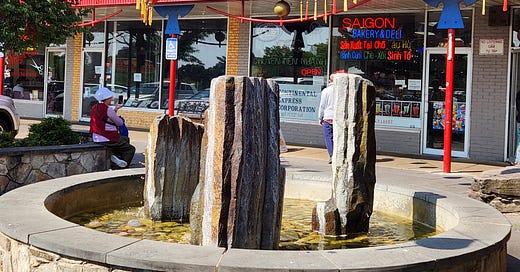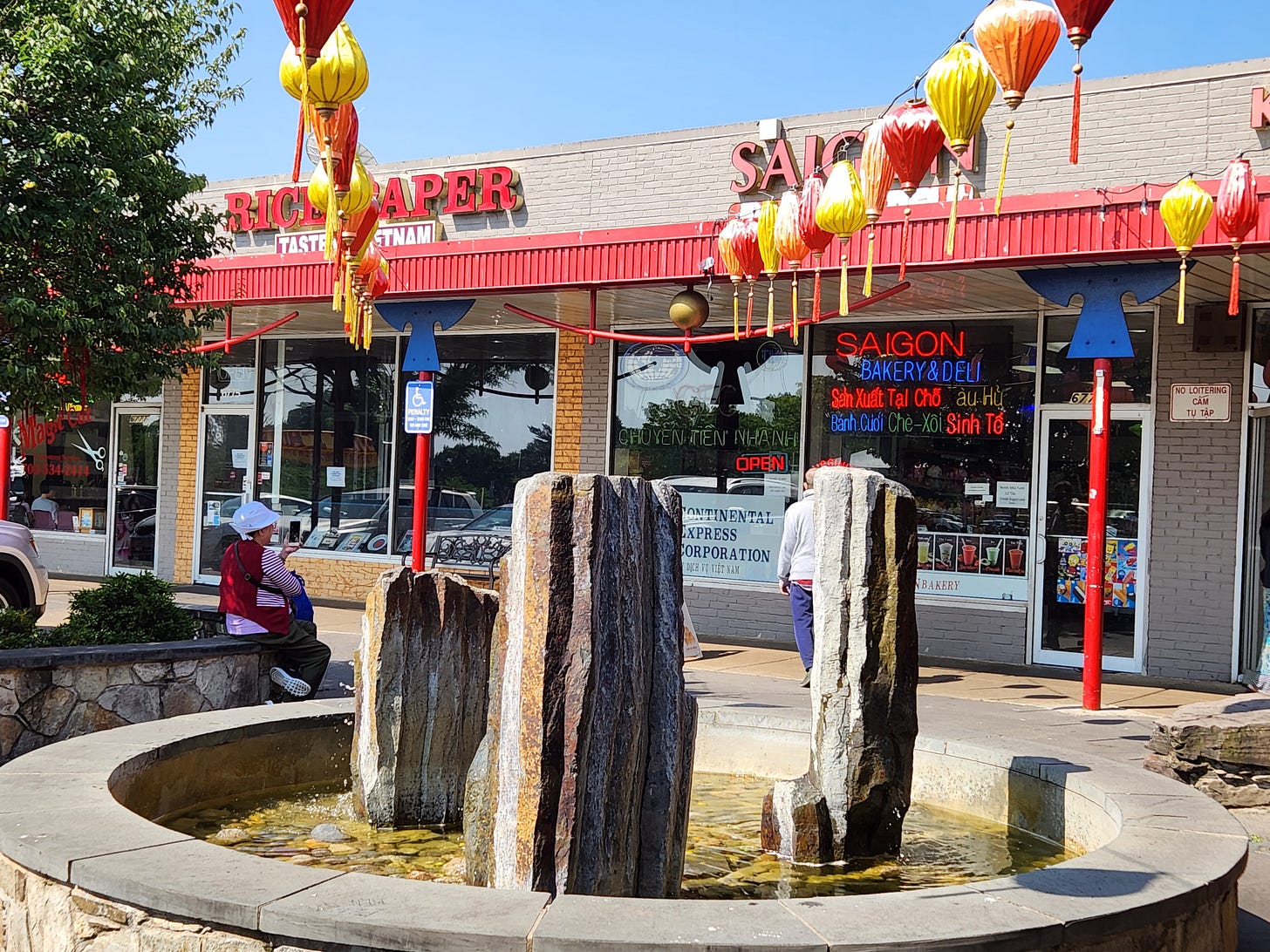Steamy and humid, the air is dense with smoke. In the distance, the pop and hiss of fireworks erupting over the National Mall. Two flags are waving in the breeze; one is the American flag, and the other flag consists of three scarlet bars lying vertically across a bright yellow banner. The parking lot is full of people celebrating the Fourth of July. From a shaded picnic table, there is the loud bellowing of Harley Davidson engines idling.
“Shut it off. You’re polluting, and we are trying to talk,” Quang Le, owner of Binh Bakery in Eden Center, said. “Old-timers,” Le laughed. “You see the flag (pointing to the red and yellow flag), that’s the flag of South Vietnam. It means a lot to them (old-timers), just as much as the other one (American flag),” Le said.
The two flag poles in the parking lot of an otherwise nondescript suburban strip mall are one of the many things that make Eden Center unique. On the surface, it feels like a generic suburban strip mall, but upon further inspection, you realize the mall is a hybrid of South Vietnam and the United States. With a replica of the clock tower from Saigon, it is a close duplicate of home for those who remember Vietnam. For the younger generations, it has become a portal to a place they have never experienced. In Falls Church, Virginia, a suburb of Washington DC, Eden Center is a gathering place for one of the largest Vietnamese populations on the Eastern Seaboard.
“On the East Coast, it’s considered the capital for the Vietnamese. No matter where you live – Maine, Massachusetts, or New York. Everybody wants to come to Eden Center once in their lifetime,” Kevin Tran, father of Viet Place Collective organizer Jean Tran, said.
However, the cultural makeup of Eden Center may change, causing some Vietnamese business owners to worry. At the end of June, the Falls Church City Council finalized the East End Small Area Plan with a vote of 7-0. The plan aims to provide “a vision for reinvestment and building on the existing strengths of the area.” There is not an exact timeline for the plan to be enacted. According to the City of Falls Church, the plan would also support economic investments, prioritize anti-displacement, enhance multi-mobility and accessibility, and activate public spaces to strengthen the sense of community, preserve and expand housing opportunities, and develop the area to be more environmentally sustainable.
Since its inception in the fall of 2021, the East End Small Area Plan has divided Northern Virginia Vietnamese community members. Those who support the plan feel it will contribute to Eden Center’s growth and keep the businesses flourishing in the future. Others who oppose the plan, like the Viet Place Collective, feel the plan will not only lead to a change in Eden Center’s character but could also lead to the Vietnamese-owned business being displaced from the mall many have called home for over thirty years.
“It’s not about the building; that’s just bricks and mortar,” Viet Place organizer Jean Tran said. “I don’t want Eden Center to become another Chinatown (Washington DC). You can put in a Sephora and a Walgreens with Vietnamese characters, and that would be considered preserved.”
The Viet Place Collective was founded in December of 2022 and has established itself as the lead anti-displacement voice of the Northern Virginia Vietnamese community. Through grassroots organizing done via social media, the collective has been able to organize those who feel the plan may lead to the beginning of gentrification while finding common ground with those who support the East End Plan.
“People came together and got involved, so we have that energy. That energy of being grassroots and of the people. And that’s how we have gotten people to organize,” Hoainam Nguyen, Viet Place organizer, humbly said.
While there is common ground between the Viet Place Collective (those who are against displacement in the East End Plan) and those who support the East End Plan, there have also been some disagreements. When the plan was finalized on June 26th, the city council meeting had a larger and rowdier audience than previous meetings. There were signs displaying “pilot and fund anti-displacement strategies” rising from the gallery whenever Pro Small Area Plan advocates like Eden Center owner Alan Frank spoke. Despite these peaceful protests, the opposing sides seem to have common ground. The Deputy Mayor of Falls Church, Letty Hardi, praised the Viet Place Collective for their communications and ability to organize via social media.
“While the East End Small Area Plan is officially adopted now, I hope this is just the beginning of further collaboration between the Viet Place activists, the Eden Center Owner/Property management, and the city,” Hardi said. “It’s clear that we all share the same goal - that we want the Eden Center and its businesses to thrive and be around for future generations. So many of the ideas from this planning process - from improving the transportation network to make it easier to get there to public art and cultural celebrations like an honorific renaming of Wilson Boulevard to Saigon Boulevard, to ideas like outreach coordinators to support the small business better - not only ensures the success of Eden Center but are also the best proactive measures against gentrification and displacement concerns.”
Despite praise from Hardi, business owners like Quang Le feel they have not had the opportunity to address all their concerns with the city or the Viet Place Collective.
“I have no problem with the collective, but if you want to be a presence, you have to be active with the community. You have to keep coming back and discuss problems; you have to communicate,” Le said.
Owners like Le feel that once the plan was finalized by the city at the end of June, the City of Falls Church and organizations like the Viet Place Collective have fallen silent.
“The city doesn’t know what to do with us (Eden Center); they don’t know how to deal with us. Ask them how much tax money they take from Eden Center, and I bet you they don’t know,” Le said.
Although the city has finalized the plan, those who opposed the plan and those who were in favor of the plan are unsure about what the future holds for the area and are uneasy about how to proceed following the city’s ruling.
“For us, success has been hard to define, but if we have been successful, it is because we formed organically. I hope we have been successful; we don’t want to get ahead of ourselves; we don’t want to make it seem like the battle is done,” Nguyen said.




